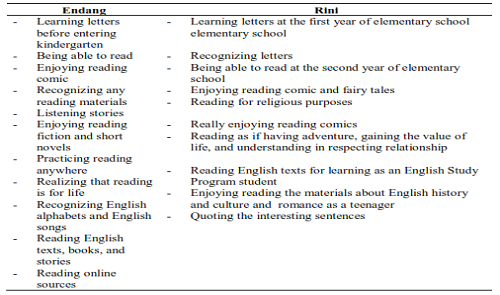
Reading Experiences on Exploring Personal Reading Histories of English Study Program Learners of University of Riau
Abstract
Keywords
Full Text:
PDFReferences
Anderson, J. N, & Nunan, D. (2008). Practical English Language; Reading (1ed.). New York. McGraw-Hill ESL/ELT.
Benard, R.H. & Ryan, W.G. (2010). Analyzing Qualitative Data; Systematic Approach 1ed.). California. SAGE Publication, Inc.
Bergbauer, A., & Staden, S. V. (2018). Social interaction determinants of south African reading literacy achievement: Evidence from prePIRLS 2011. International Journal of Instruction. 11 (2), 1308-1470.
Bumford, J., & Day, R. R. (1998). Extensive reading activities in the second languageclassroom (1st ed.). UK. Cambridge University Press.
Bumford, J., & Day, R. R. (2004). Extensive reading activities for teaching language (1ed.). UK. Cambridge University Press.
Brown, H. D. (2001). Teaching by Principles an Interactive Approach to Language /Pedagogy (3rd ed.), New York. Pearson Education Inc.
Chen, K.Y. (2014). Vocabulary, Syntactic Knowledge and Reading Comprehension; the Perspective of College Students. 66, 39-52.
Davidson, K. (2010). The integration of cognitive and sociocultural theories of literacy development: Why? How?.The Alberta Journal of Educational Research. 56( 3), 246-256.
Denscombe, M. (2007). The Good Research Guide (1ed.). Open University Press. NewYork.
Delfi, S., &Yamat, H. (2017). Extensive reading in developing language Competency for Indonesian EFL Learners Majoring in English. IJELTAL, 2 (1), 153-164.
Delfi, S., &Yamat, H. (2017). An Analysis of reading performances of Indonesian EFL Learners for Extensive reading practice. Journal of Educational Sciences, 1 (1), 35-44
Delfi, S., (2017). Reading experiences on the personal exploration of reading histories of students of FKIP Universtas Riau. Atlantis Press, ASSEHR. 10, 173-178
Delfi, S., Diah. S. F. &Jismulatif. (2017). An Analysis of Exploring Personal Reading Histories for Learners of FKIP University of Riau, Proceedings – ICES, 363-369.
Delfi, S., Diah. S. F,.&Jismulatif. 2018. Exploring personal reading histories in developing reading interest of English Study Program learners of University of Riau. IJELTAL, 2 (2), 35-44
Hammer, J. (2009). How to Teach English. England (1ed.). Pearson Education Limited.
Hedge, T. (2008). Teaching and Learning in the Language Classroom. University Press. New York. Oxford.
Hedgcock. S. J. & Ferris R. D. (2009). Teaching Readers of English, Students, Texts, and Contexts (1st ed.). New York, Routledge.
Ho-Hyuk, J., Mun-Koo, Kan., Young-Hee, K. (2015). The Effect of English Extensive Reading Activities on Student’s Reading Proficiency and Reading Motivation. Advanced Science and Technology Letters 9 (2), 92-95.
Iftanti, E.( 2015). A survey of the English reading habits of EFL students in Indonesia. Teflin Journal, 23(2), 149-164.
Junita, D., Suarman, S., &Kartikowati, S. (2018). Accomplishment motivation and soft skill related to learning achievement. Journal of Educational Sciences, 2 (2), 83-89
Kamaruddin, K., & Ahmal, A. (2018). The study of history based on local antiquity: A case study of existence of Kampar River in Analyzing the past Maritime in teaching history. Journal of Educational Sciences, 2 (1), 72 -82
Kao, P. (2010). Examining Second Language Learning Taking a Sociocultural Stance. RECLS 7, 113-131
Lee, S. Y., & Hsu, Y. Y. 2009. Determining the crucial characteristics of extensive reading programs: The impact of extensive reading on EFL writing. The International Journal of Foreign Language Teaching, 5(1), 12-20.
Lightbown, P. M., & Spada, N. 2013. How Languages are Learned 4th edition-Oxford Handbooks for Language Teachers. Oxford University Pres.
McLeod, S. (2007). Lev V Vygotsky. http://www.implypsychology.org/vygotsky.html.
Mermelstein. D.A. (2014) Improving EFL learners’ reading levels through extensive reading. Reading in a Foreign Language. 27 (2), 182-198.
Milliners. (2017). One Year of Extensive Reading on Smart phones, A Report. jalt call Journal 13 (1), 49-58.
Nor, M. N., & Rashid, A., R. (2018). A review of theoretical perspectives on language learning acquisition. Kasetsart Journal of Social Sciences. 39, 161-167.
Panhwar, A. H., Ansari, S. & Ansari, K. (2016). Sociocultural theory and its role in the development of language pedagogy. Advances in Language and Literacy Studies, 7 (6), 2203-4714.
Reza, Ghafar S. & Mahmood, Dehqan. (2013). Sociocultural Theory and Reading Comprehension: The Scaffolding of Readers in an EFL Context. International Journal of Research Studies in Language Learning 2 (3), 67-80.
Shabani, K. (2016). Applications of Vygotsky’s sociocultural approach for teachers’ Professional development. Cogent Education, 3, 1-10.
Salem, A. A. M. S. (2017). Scaffolding Reading Comprehension Skills. English Language Teaching, 10 (1), 1916-4750.
Salikin et al, (2017) The Indonesian EFL learners’ motivation in reading. Canadian Center of Science and Education. English Language Teaching, 10 (5) 1916-4750.
SarwoEdy. (2014). The effectiveness of extensive reading on students’ reading comprehension achievement as Observed from students’ motivation. JurnalPendidikanHumaniora. 2 (2), 54-58.
Shih, P., Velan, G. R. &Shulruf. B. (2017). Shared values and socio-cultural norms: E-learning technologies from a social practice perspective. Issues in Educational Research. 27 (3), 550-556.
Wisaijorn, P. (2017). Effects of Extensive Reading on Thai University Students. PASAA PARITAT Journal, 32, 29-61.
Zhang, Q. (2015). Emergent Literacy as Sociocultural Practice: How Well Do New Zealand Parents Fit with Ta Whariki?.Journal of Childhood Literacy, 17 (1), 1-23.
DOI: http://dx.doi.org/10.31258/jes.3.3.p.303-317
Refbacks
- There are currently no refbacks.
Copyright (c) 2019 Syofia Delfi, Fangiana Safitri Diah, Maria Safriyanti

This work is licensed under a Creative Commons Attribution 4.0 International License.
Publisher: FKIP Universitas Riau












